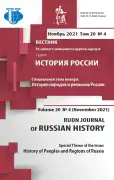Activities of the NKVD of the Far East in the fight against crime in the second half of 1945
- 作者: Zhadan A.V.1
-
隶属关系:
- Vladivostok branch of Far East legal institute Ministry of Internal Affairs of Russia
- 期: 卷 20, 编号 4 (2021): History of Peoples and Regions of Russia
- 页面: 555-567
- 栏目: HISTORY OF PEOPLES AND REGIONS OF RUSSIA
- URL: https://journal-vniispk.ru/2312-8674/article/view/321804
- DOI: https://doi.org/10.22363/2312-8674-2021-20-4-555-567
- ID: 321804
如何引用文章
全文:
详细
This article examines the causes and conditions of the aggravation of the criminal situation in the Far East in the second half of 1945 and the historical experience of local NKVD (People’s Commissariat of Internal Affairs) bodies in maintaining law and order under the conditions of the Soviet-Japanese war and the first post-war period. Based on the analysis of the documentation of the NKVD departments of Primorye and Khabarovsk territories, including internal administrative documents (orders, plans, etc.), as well as materials of primary party organizations (minutes of party meetings, certificates, memos, etc.), the author draws conclusions about the development of the criminal situation in the region, and discusses the NKVD’s ways and directions to ensure law and order. Studying the stated problems, it was possible not only to state the presence of negative dynamics in the number and severity of criminal manifestations, but also to establish that the criminal crisis of the second half of 1945 was caused by the imposition of new socio-economic and political factors (including the amnesty for prisoners, the relocation of large masses of troops, the Soviet-Japanese war, the placement of prisoners of war, demobilization) on the already difficult criminal situation that had developed during the Great Patriotic War. The study largely confirmed the fact repeatedly noted in historiography about the impact of “personnel starvation” and problems of material support on the effectiveness of the NKVD in the war and post-war period. The archival documents show that the main ways to normalize the operational situation in the Far East region were measures concerning organizational work and operational-search activities, as well as control-methodical and administrative measures. The author concludes that the measures taken allowed the NKVD of the Far East to reverse the explosive growth of serious street crime by the end of 1945. However, this success was only partial - the overall level of criminal activity in the region continued to remain at a fairly high level for several post-war years.
作者简介
Alexander Zhadan
Vladivostok branch of Far East legal institute Ministry of Internal Affairs of Russia
编辑信件的主要联系方式.
Email: awzhadan252@mail.ru
Ph.D. in History, Senior Lecturer
21, Kotelnikova St., Vladivostok, 690087, Russia参考
- Belousova, O.V. “The myth of Stalin and the memory space: opportunities for a new research approach.” Voprosy Istorii, no. 8 (2020): 266-273 (in Russian)
- Borodkin, L.I. “GULAG during the war: mobilization economy in extreme mode.” Ural Historical Bulletin, no. 4 (2018): 46-54 (in Russian)
- Dorokhov, V.Zh. “ ‘Personnel famine’ in the police of the USSR in 1945-1949 (on the example of the Khabarovsk territory).” Questions of national and Federal relations, no. 1 (2017): 14-19 (in Russian)
- Emelin, S.M. “Historiography of the NKVD-MVD activity in the late 1930s - mid-1950s.” History of State and Law, no. 24 (2009): 41-45 (in Russian)
- Erin, M.E., and Moisinovich, A.M. “Problems of Stalinism in modern historiography.” Bulletin of Yaroslavl state University named after P.G. Demidov. Series: Humanitarian Sciences, no. 1 (2011): 5-11 (in Russian).
- Gallyamova, L.I. “The Far East of the USSR during the Great Patriotic war in the coverage of modern regional historiography.” Russia and the Asia-Pacific region, no. 2 (2020): 23-40 (in Russian)
- Khudyakov, P.P., and Shvets, A.V. Formation and development of the organizational and legal foundations and structure of the police apparatus of the Amur region (1917-1982). Blagoveshchensk: Blagoveshchensk branch of the DVUI Publ., 2008 (in Russian)
- Kuznetsov, D.A. “Organization of law enforcement and fighting crime in southern Sakhalin (1945-1950).” Russia and the Asia-Pacific region, no. 2 (2009): 101-109 (in Russian)
- Latyshev, A.V. “The work of the NKVD filtration camps in 1942: the influence of economic factors and departmental interests.” Voprosy Istorii, no. 2 (2019): 36-48 (in Russian)
- Lyaskina, N.V. “Features of extracurricular work in the prevention of child homelessness and neglect in the Primorsky territory (1941-1945).” Humanitarian readings. Collection of articles of the all-Russian scientific and practical conference dedicated to the 75th anniversary of the Great Victory, 84-90. Vladivostok: Far Eastern Federal University Publ., 2020 (in Russian)
- Milezhik, A.V. “Formation of a scientific school on the history of law enforcement agencies in the Russian far East.” Clio, no. 1 (2019): 128-135 (in Russian)
- Serebrennikov, S.V. “Escapes of Japanese prisoners of war from Soviet camps (1945-1956). (Pages of domestic and foreign historiography).” Izvestiia Volgograd state pedagogical University, no. 9 (2017): 184-194 (in Russian)
- Shabel'nikova, N.A. “The Great victory in the memory of generations: the Second world war in modern Far Eastern historiography.” Klio, no. 5 (2020): 20-27 (in Russian)
- Shabelnikova, N.A., and Bakshutov, S.N. “Activities of the Primory militia during the great Patriotic war.” In The Great Patriotic war and the Second World War: the far Eastern dimension: materials of the Intern. Forum, 319-320. Vladivostok: Far Eastern Federal publishing House, 2015 (in Russian)
- Suverov, E.V. “Fight against banditry in the post-war period in Western Siberia (1945-1949).” Actual problems of fighting crimes and other offenses, no. 16-1 (2016): 23-25 (in Russian)
- Tkacheva, G.A., and Zhadan, A.V. “Socio-economic determinants of criminalization of Primorye society in 1941-1945.” Society: philosophy, history, culture, no. 1 (2018): 94-99 (in Russian)
- Vashchuk, A.S., ed. Mir posle voiny: dal'nevostochnoe obshchestvo v 1945-1950 e gg. Vladivostok: Dalnauka Publ., 2009 (in Russian)
- Ziborov, V.K., Ivanov, V.A., and Khodyakov, M.V. “ ‘Cadres decide everything!’ Blockade notes of an NKVD officer. 1942.” Modern History of Russia, no. 2 (2015): 246-276 (in Russian)
补充文件









